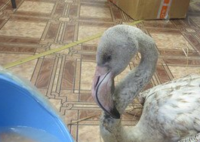Pink flamingos fall on people's heads in Siberia
Two pink flamingos were found in two Siberian regions - in Evenkia Republic and in Tomsk region. In both cases, the birds that inhabit the territories located much further south, suffered from frostbite. The birds are alive, and experts do not lose hope for their recovery.

One of the birds literally fell from the sky down on the head of an Evenki hunter from the town of Miriyuga, officials with the press service of the Evenki territory said. The man, Pyotr Sidorkin, was going home after hunting, when a pink flamingo fell down on the ground near him. The hunter brought the bird home, where his wife, Nadezhda, started taking care of the unusual guest. Local residents assumed that the bird suffered from cold in the last days of October, when temperatures fell to -30 below zero Centigrade.
The family was taking very good care of the bird, as if it was their sick child. Pyotr and Nadezhda consulted the municipal department for environment to learn what to feed the bird with. "We recommended the family couple to feed the bird with mashed carrots, beets, minced fish and meat, putting all the food in a basin of water. The flamingo's appetite was quite good," the chief of the department, Ekaterina Vershinina said.
Afterwards, the bird was transported from Miryuga to Krasnoyarsk. The Kasnoyarsk Flora and Fauna Park Roev Ruchey was chosen as a new home for the bird, as specialists of the park had had experience in taking care of sick birds.
"On Wednesday, the flamingo was delivered to Krasnoyarsk, where doctors examined him. The bird is weak, but it is still too early to say whether it is going to survive or not. Specialists of the park said that they would do their best to save the bird's life. They have experience - some time ago, a crane that was also found in the North, recovered owing to people's efforts," Nadezhda Vershinina said.
In Krasnoyarsk, the flamingo from Evenkia found good company - there are already eight pink flamingos living in the park of the city, LifeNews reports. "The bird is young, it was born this year, but it is very weak. It can hardly stand on its legs. Now the bird is in quarantine, but we hope it will live. We have everything to save its life," deputy director for veterinary control of the Krasnoyarsk flora and fauna park, Yuri Makhrov said.
Press Secretary of Roev Ruchey, Ekaterina Mikhailova, confirmed to the Rossiyskaya Gazeta that the bird was staying in serious condition. According to Mikhailova, the flamingo neither eats, nor stands up on legs. Veterinarians' efforts bring no results yet.
According to the official, the flamingo lost the way of migration, which passes through the Krasnoyarsk region of Russia. Usually, it is juveniles that lose the way as they find themselves in the midst of a warm air front. Warm air carries birds in a wrong direction against their will. Ornithologists believe that it was just the case this time. This is evidenced by the change of weather, when it got suddenly warmer.
Another pink flamingo was discovered in the Tomsk region of Russia at about the same period of time. Fishermen from the village of Komsomolsk saw an unusual bird that landed on the ice of a local lake, Sibnovosti reports. Specialists subsequently found that the bird had its neck injured; the right leg of the bird was frostbitten. The bird was delivered to the Tomsk zoo, where specialists take effort to save its life.
Stray flamingos have been found before in Irkutsk, Kemerovo and Leningrad regions of Russia. During the 1990s, two birds were found in Evenkia - the birds were discovered already frozen. Ten years ago, Roev Ruchey Park became home to flamingo named Fimka - the bird was found in the Krasnoyarsk region. In 2011, in the Tomsk region, people saw a small flock of pink flamingos. Only two of them were caught. The frostbitten birds were taken to the northern natural park, but specialists failed to save them.
Flamingos are common in Africa, the Caucasus (Azerbaijan), South-East and Central Asia, as well as in South and Central Americas. Colonies of flamingos also inhabit the south of Spain and Sardinia. The bird leads sedentary life, but northern populations of pink flamingos are migratory.
The closest habitat of pink flamingos to West Siberia is Lake Tengiz in Kazakhstan.
Pravda.Ru
Subscribe to Pravda.Ru Telegram channel, Facebook, RSS!


